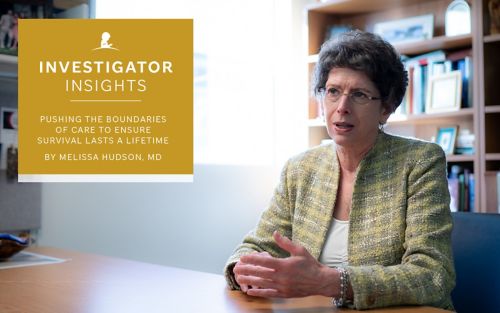St. Jude Family of Websites
Explore our cutting edge research, world-class patient care, career opportunities and more.
St. Jude Children's Research Hospital Home

- Fundraising
St. Jude Family of Websites
Explore our cutting edge research, world-class patient care, career opportunities and more.
St. Jude Children's Research Hospital Home

- Fundraising
Pushing the boundaries of care to ensure survival lasts a lifetime

Melissa Hudson, MD, Division of Cancer Survivorship director in the Department of Oncology, works to ensure that surviving pediatric cancer means having the best quality of life possible for an entire lifetime.
When I reflect on the history of achievements in cancer treatment at St. Jude, I think of how overall five-year survival rates for children with cancer now exceed 85%, and treatments continue to evolve to increase this number further. But if you look beyond five years, it is clear we still have much work to do.
We have a substantial population of survivors of cancer who experience adverse outcomes related to their treatment, ranging from serious life-threatening conditions, such as heart disease and subsequent cancers, to life-altering conditions, such as infertility and cognitive deficits. As treatment strategies continue to evolve, we must reframe the metrics of success for the long-term outcomes of these patients. Monitoring health over an entire lifetime, from childhood potentially into and beyond survivors’ sixth and seventh decades, is something St. Jude is uniquely able to do.
When I started practicing in 1989, the adverse effects of cytotoxic therapies in young children were well appreciated, such as impairment in bone and soft tissue development, linear growth and puberty, and cognitive function. These observations motivated the development of pediatric-focused treatment strategies, balancing the dual goals and optimizing cancer control while minimizing treatment toxicities.
In my early years at the St. Jude After Completion of Therapy Clinic, I learned very quickly from survivors and families’ increasing communications that cancer treatment complications extended well beyond impairment in growth and intellectual development in children. Our adult survivors of childhood cancer were experiencing serious complications that contributed to premature mortality.
By the 2000s, the late effects literature had evolved substantially from descriptive reports to outcomes investigations from childhood cancer cohorts like the Childhood Cancer Survivor Study (CCSS), permitting more accurate characterization of risks beyond patient demographics and generic treatment exposures. These studies provided the foundation for personalized survivorship care based on specific patient, treatment and cancer factors that we used in the After Completion of Therapy Clinic, which became the standard of care in pediatric late effects clinics.
During this decade, as the number of long-term childhood cancer survivors were aging out of pediatric programs, delivery of care involved diverse clinicians, including pediatric oncologists, primary care providers and a variety of subspecialty providers with variable knowledge about childhood cancer and late effects. While some late effects programs like St. Jude were pursuing risk-based care, in general, there was a lack of standards for survivors’ health maintenance. Working within the Children’s Oncology Group, we developed guidelines to standardize survivorship care based on evidence from the abundant late effects literature linking late effects with therapeutic exposures.
Over the past few decades, major advances have been achieved in characterizing survivorship outcomes. In particular, pediatric cancer cohorts like the CCSS and St. Jude Lifetime Cohort Study (St. Jude LIFE), among others, have advanced knowledge about the health of aging survivors and the substantial lifelong impact of the childhood cancer experience.
Personalized survivorship care now considers factors beyond age and treatment that contribute to adverse outcomes, such as genetics, chronic health conditions, and access to health care and rehabilitation resources. This knowledge has been essential in guiding the development of clinical trials for newly diagnosed children with cancer and providing care for long-term survivors. The infrastructure established by St. Jude facilitates monitoring the health of survivors across their lifespans. As such, we are uniquely positioned to continue to evaluate outcomes of emerging novel therapy to determine their long-term benefits and potential unanticipated effects.
Clearing the information hurdle to provide long-term benefit
In addition to understanding the causes of treatment-related health effects and refining care, our survivorship clinical care at St. Jude includes education about cancer-related health risks, counseling about risk mitigation, providing care plans, highlighting the benefits of healthy living and communicating with primary care providers. Our current challenge is making sure this knowledge is disseminated to the primary care community who care for our adult survivors.
Despite the availability of evidence-based survivorship guidelines for several decades, most adults treated for childhood cancer do not receive guideline-adherent care that can provide opportunities for early detection of cancer treatment effects and interventions to keep them healthy. For example, a former patient shared during a recent St. Jude LIFE visit that her primary care physician would not order breast cancer screening because she was too young, despite publications shared attesting to her increased risk of breast cancer after chest radiation. Our ongoing efforts aim to improve understanding of the barriers faced by survivors and their health care team and provide them with information and resources to deliver personalized care that can optimize health and quality of life outcomes in long-term survivorship. These efforts include collaborations to develop educational platforms that facilitate care and advocate for legislation to support survivorship care.
I am excited to continue to be a part of this work and even more excited that we have a lot of smart young people that hopefully will be able to leverage newer technologies to achieve these goals.
Through programs such as St. Jude LIFE, we have documented the long-term “costs” of surviving childhood cancer. Everything we have done along the way to improve outcomes for survivors of childhood cancer gives us more impetus to keep doing better. Our responsibility is to use this knowledge to increase awareness about the risks that come with childhood cancer and its treatment and assure that our survivors have access to the care and services that allow them to have the best quality of life possible.






